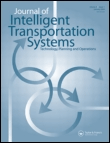
Journal of Intelligent Transportation Systems
Scope & Guideline
Exploring Intelligent Solutions for Modern Mobility Challenges
Introduction
Aims and Scopes
- Intelligent Transportation Systems (ITS) Research:
The journal emphasizes the development and implementation of intelligent transportation systems that integrate technology to optimize traffic management, enhance public transportation, and improve overall transportation efficiency. - Data-Driven Approaches:
A significant focus on utilizing big data, machine learning, and artificial intelligence to analyze transportation patterns, predict traffic behaviors, and enhance decision-making processes within transportation networks. - Autonomous and Connected Vehicles:
Research on the impact of autonomous and connected vehicle technologies on traffic flow, safety, and infrastructure is a core area, exploring how these innovations can transform transportation. - Sustainability and Environmental Impact:
The journal frequently addresses sustainability issues, examining the environmental impacts of transportation systems and proposing eco-friendly solutions to mitigate negative effects. - Traffic Safety and Management:
A consistent focus on improving traffic safety through innovative management strategies, modeling techniques, and real-time monitoring systems to reduce accidents and enhance road user safety. - Multimodal Transportation Systems:
Research on integrating various modes of transportation, including public transit, biking, and ridesharing, to create efficient, user-friendly multimodal transport systems.
Trending and Emerging
- Machine Learning and AI Applications:
There is a growing trend towards the application of machine learning and artificial intelligence in traffic prediction, vehicle behavior modeling, and autonomous systems, indicating a shift towards data-driven decision-making in transportation. - Sustainable Transportation Solutions:
An increasing focus on sustainability, including research on electric vehicles, eco-driving strategies, and the environmental impact of transportation systems, showcases the industry's commitment to greener alternatives. - Connected and Autonomous Vehicle Technologies:
The rise of connected and autonomous vehicle technologies is a prominent theme, with significant research dedicated to their integration into existing transportation systems and their potential to improve safety and efficiency. - Real-Time Traffic Monitoring and Management:
Emerging research is increasingly directed at real-time traffic monitoring systems that leverage advanced sensors and data analytics to enhance traffic management and reduce congestion. - User-Centric Transportation Solutions:
There is an emerging emphasis on user-centric approaches in transportation planning, focusing on the needs and behaviors of users, particularly in multimodal transport and shared mobility services.
Declining or Waning
- Traditional Traffic Engineering Models:
There has been a noticeable decline in the publication of papers focused on conventional traffic engineering models, as the field shifts towards more innovative, data-driven approaches that incorporate advanced technologies. - Manual Data Collection Techniques:
Research relying on manual data collection methods has decreased, with a clear pivot towards automated and technology-driven data acquisition methods, such as sensors and connected vehicle data. - Static Traffic Control Systems:
Interest in traditional, non-adaptive traffic control systems appears to be waning in favor of dynamic and adaptive systems that respond in real-time to traffic conditions and demands.
Similar Journals
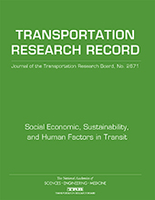
TRANSPORTATION RESEARCH RECORD
Shaping Policy Through Cutting-Edge ResearchTRANSPORTATION RESEARCH RECORD is a premier journal published by SAGE PUBLICATIONS INC, focusing on the latest advancements and research in the fields of civil and structural engineering as well as mechanical engineering. Since its inception in 1974, this journal has become an essential platform for disseminating innovative methodologies, case studies, and comprehensive reviews that address critical issues in transportation systems and infrastructure. With a respectable Q2 ranking in both engineering categories as of 2023, it solidifies its position among reputable publications, catering to a diverse range of scholars, professionals, and students. The journal not only facilitates access to high-quality research but also plays a pivotal role in shaping policy and practice through its robust findings. For those invested in the engineering disciplines, particularly within the transportation domain, TRANSPORTATION RESEARCH RECORD is an invaluable resource, with a wide array of topics covered throughout converged years, from 1974 to 1990, and from 1993 to 2024, ensuring a comprehensive exploration of historical and contemporary challenges in transportation.
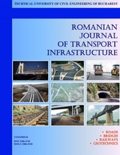
Romanian Journal of Transport Infrastructure
Innovating Infrastructure for Sustainable MobilityWelcome to the Romanian Journal of Transport Infrastructure, a premier publication dedicated to advancing knowledge in the field of transport infrastructure engineering and management. Published by SCIENDO, this open access journal has been committed to sharing significant research and developments since 2012, ensuring that vital information is readily available to the global academic community. The journal's ISSN is 2286-2218, and it provides a platform for researchers, professionals, and students to collaborate and disseminate findings related to transport systems planning, design, construction, and maintenance. The Romanian Journal of Transport Infrastructure aims not only to contribute to scholarly literature but also to influence policy and practice related to transportation challenges. Our editorial team strives to maintain high standards of academic rigor and relevance, making this journal an essential resource for anyone involved in the transport infrastructure sector.
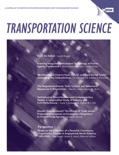
TRANSPORTATION SCIENCE
Empowering Research in Civil and Structural EngineeringTRANSPORTATION SCIENCE is a premier scholarly journal focusing on the interconnected disciplines of transportation, civil and structural engineering, and social sciences. Published by INFORMS, this journal has been a fundamental resource for nearly five decades, covering seminal research and innovative methodologies that have shaped the field of transportation. With a distinguished Q1 ranking in both Civil and Structural Engineering and Transportation for 2023, it ranks in the top tier of journals, reflecting its significant impact in advancing knowledge and practice. Researchers, professionals, and students will find this journal an essential platform for disseminating their findings and engaging with cutting-edge developments in transportation systems. TRANSPORTATION SCIENCE offers access to robust analytical frameworks and empirical research that contributes to the ongoing conversations in transportation, ensuring that emerging trends and challenges are met with scholarly rigor.
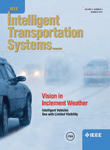
IEEE Intelligent Transportation Systems Magazine
Exploring the Intersection of Technology and TransportationIEEE Intelligent Transportation Systems Magazine, published by the IEEE-Institute of Electrical and Electronics Engineers Inc., is a leading journal in the fields of automotive engineering, computer science applications, and mechanical engineering. With an impressive impact factor reflected in its 2023 rankings, this journal sits in the top quartile (Q1) across multiple engineering categories, making it an essential resource for researchers and professionals dedicated to advancing the intelligent transportation systems landscape. The magazine covers a diverse array of topics from vehicle technology innovations to traffic management solutions, aimed at improving transportation efficiency, safety, and sustainability. Since its inception in 2009, the publication has established a solid reputation for disseminating cutting-edge research and practical applications in intelligent transportation, all while remaining an accessible resource for academic and industrial stakeholders alike. Subscribe today to stay at the forefront of transformative transportation technologies!
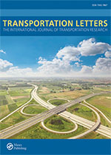
Transportation Letters-The International Journal of Transportation Research
Shaping the future of logistics and infrastructure with vital research.Transportation Letters - The International Journal of Transportation Research, published by Taylor & Francis Ltd, is a leading journal dedicated to advancing the field of transportation studies. With an impact factor that reflects its significance within the academic community and a prestigious ranking of Q2 in Transportation, this journal provides a critical forum for the dissemination of innovative research and insights in transportation systems, policies, and technologies. Covering a broad scope of topics from urban mobility to logistics and infrastructure, Transportation Letters serves as an essential resource for researchers, professionals, and students aiming to deepen their understanding of transportation issues facing society today. With over a decade of publication since 2009, the journal has established a solid reputation, ranking 46th out of 141 in Scopus's transportation category, placing it in the 67th percentile. Although it does not operate under an open-access model, it remains committed to accessibility through various subscription options, ensuring that vital research is available to those shaping the future of transportation.
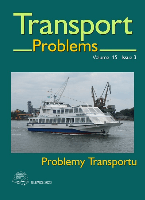
Transport Problems
Advancing the Future of Transportation ResearchTransport Problems, published by the Silesian University of Technology, Faculty of Transport, is a distinguished open-access journal that has been advancing scholarship in the fields of Automotive Engineering, Mechanical Engineering, and Transportation since its inception in 2007. With an ISSN of 1896-0596 and an E-ISSN of 2300-861X, this journal serves as a vital platform for researchers and practitioners to disseminate innovative research findings and explore fundamental issues in transport systems and technologies. Based in Poland, the journal covers various topics including transportation logistics, vehicle dynamics, and environmental impacts, thereby addressing critical challenges faced in the transportation sector globally. As reflected in its Scopus rankings, the journal occupies respectable quartiles and continues to contribute valuable insights to the academic community. By making its content freely accessible, Transport Problems significantly enhances the ability of researchers and students alike to engage with the latest developments in transport engineering and contribute to this ever-evolving field.
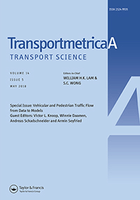
Transportmetrica A-Transport Science
Shaping the Future of Mobility Through ResearchTransportmetrica A-Transport Science, published by Taylor & Francis Ltd, is an influential journal at the forefront of transport science research. With an ISSN of 2324-9935 and an E-ISSN of 2324-9943, the journal spans a diverse range of topics within the field of transportation and engineering. Since its inception in 2013, it has aimed to provide a platform for high-quality, innovative research, reflecting significant advancements and challenges in transportation systems. Recognized for its academic rigor, it has achieved a Q1 ranking in Engineering (miscellaneous) and a Q2 ranking in Transportation for 2023, reflecting its impact and relevance in these fields. With impressive Scopus rankings of #31/307 in General Engineering and #31/141 in Transportation, the journal is positioned in the top 90th and 78th percentiles respectively. Though not an open-access publication, Transportmetrica A promotes accessibility of knowledge and strives to foster discourse among researchers, professionals, and students alike, making it an essential resource for anyone invested in the future of transportation science.

Vehicles
Empowering Research for Sustainable TransportationVehicles is a pioneering open access journal published by MDPI since 2019, dedicated to advancing knowledge in the fields of Automotive Engineering and Electrical and Electronic Engineering. Based in Switzerland, the journal provides a valuable platform for researchers, professionals, and students to disseminate high-quality, peer-reviewed research across essential areas of vehicle technology and innovation. With an impressive Q2 ranking in both Automotive Engineering and Electrical and Electronic Engineering as of 2023, and a notable placement in the Scopus rankings (Rank #37/125 and #320/797, respectively), Vehicles plays a critical role in fostering collaboration and knowledge exchange within these fast-evolving disciplines. Through its commitment to Open Access, Vehicles ensures that cutting-edge research is accessible to a global audience, thereby contributing significantly to the collective understanding and development of sustainable transportation solutions. Situated at the crossroads of engineering innovation and practical application, Vehicles invites contributions that explore contemporary challenges and promote transformative advancements in the automotive sector.

International Journal of Intelligent Transportation Systems Research
Enhancing Mobility with Innovative ResearchInternational Journal of Intelligent Transportation Systems Research, published by Springer, stands as a premier platform for disseminating cutting-edge research in intelligent transportation systems (ITS). Established in 2010, this journal has made significant strides in addressing the complexities and innovations within the realm of transportation engineering, automotive technology, control systems, and information systems, reflected in its impressive categorization across diverse engineering and applied mathematics disciplines with notable rankings in Q2 and Q3 quartiles. With a steadfast commitment to advancing knowledge and fostering discussions that bridge academia and industry, the journal welcomes high-quality research articles, reviews, and case studies that explore emerging trends, technologies, and methodologies shaping the transport sector. Researchers, professionals, and students alike will find a wealth of insights aimed at optimizing operational efficiencies and enhancing safety and sustainability in transportation networks. As of 2023, the journal continues to thrive, seeking to compile contributions that align with its mission of improving transportation systems globally.
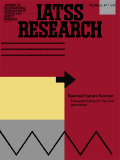
IATSS Research
Fostering collaboration for transformative safety solutions.IATSS Research, published by Elsevier Science Ltd, stands as a premier open-access journal at the intersection of engineering, safety research, urban studies, and transportation. Established in 2000, this esteemed journal caters to a diverse audience of researchers, industry professionals, and students eager to delve into innovative research that addresses pressing societal challenges. With an impressive impact factor and a consistent demonstration of high-quality scholarship, IATSS Research has achieved notable rankings within Scopus, including a top-tier position in Safety Research (Rank #13/109, 88th percentile) and Engineering (Rank #46/307, 85th percentile). The journal has evolved significantly since its inception, reflecting the dynamic nature of its converged fields from 2008 to 2024. By embracing open access, IATSS Research amplifies the reach of critical findings and fosters collaboration across disciplines, making it an invaluable resource for anyone invested in advancing knowledge and practices in modern engineering and urban safety.